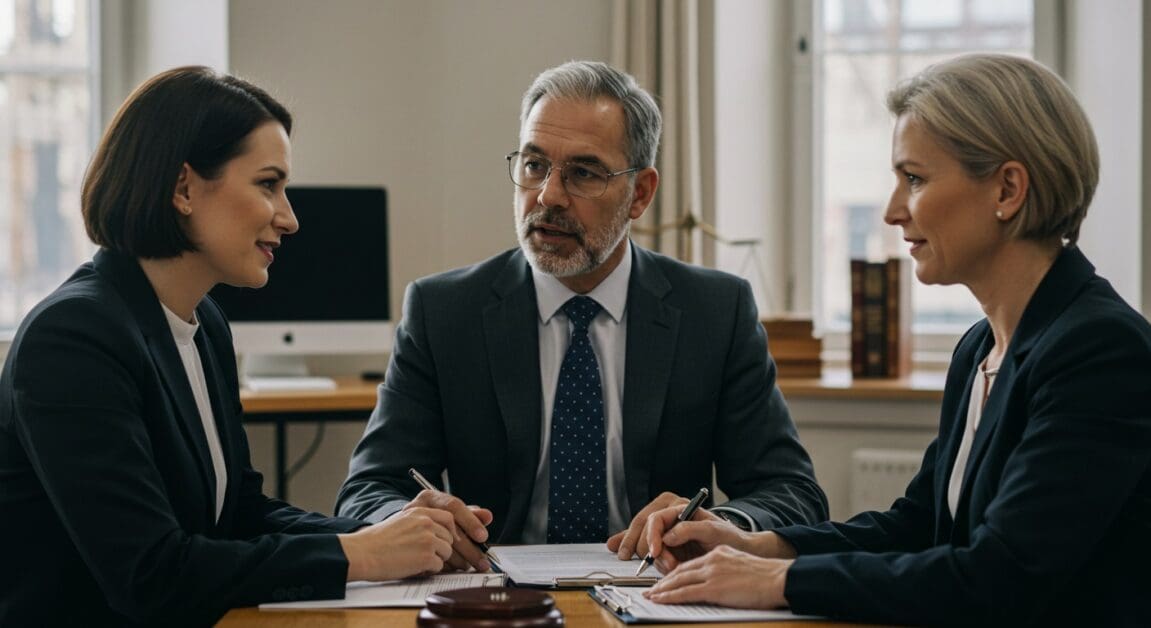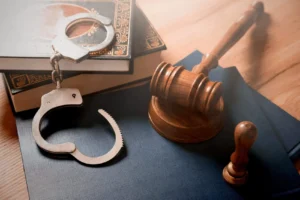Criminal Defense Attorney: Building a Strong Defense Strategy
In the realm of criminal law, the role of a criminal defense attorney is paramount in safeguarding the rights of the accused and ensuring a fair trial. The process of building a strong defense strategy is complex and multifaceted, requiring a deep understanding of legal principles, investigative techniques, and courtroom procedures. This article delves into the intricacies of crafting an effective defense strategy, exploring the various components that contribute to a robust legal defense.
The foundation of any successful defense strategy begins with a thorough investigation of the case. A skilled criminal defense lawyer must meticulously examine all available evidence, including police reports, witness statements, and physical evidence. This initial phase is crucial in identifying potential weaknesses in the prosecution’s case and uncovering information that may exonerate the defendant. The attorney must leave no stone unturned, as even the smallest detail could prove pivotal in building a strong defense.
One of the primary tools in a defense attorney’s arsenal is the ability to challenge the admissibility of evidence. This involves scrutinizing the methods used by law enforcement to obtain evidence and ensuring that all constitutional protections were observed. If evidence was obtained through illegal searches or seizures, violating the Fourth Amendment, a competent defense attorney will move to have such evidence suppressed. This strategy can significantly weaken the prosecution’s case and may even lead to dismissal of charges.
The concept of reasonable doubt plays a central role in criminal defense. It is the defense attorney’s responsibility to create or amplify doubt in the minds of jurors regarding the defendant’s guilt. This can be achieved through various means, such as presenting alternative theories of the crime, highlighting inconsistencies in witness testimony, or demonstrating the unreliability of certain types of evidence. A skilled defense lawyer will weave a narrative that casts doubt on the prosecution’s version of events, potentially leading to an acquittal.
In cases where the evidence against the defendant is substantial, plea bargaining becomes an essential strategy. Plea negotiations involve discussions between the defense attorney and the prosecutor to reach an agreement that may result in reduced charges or a lighter sentence. This process requires a delicate balance of assertiveness and diplomacy, as the defense attorney must advocate for the best possible outcome for their client while maintaining a productive dialogue with the prosecution.
The importance of expert witnesses in building a strong defense cannot be overstated. In many cases, particularly those involving complex technical or scientific evidence, the testimony of expert witnesses can be crucial in challenging the prosecution’s case. A criminal defense attorney must be adept at identifying and retaining qualified experts who can provide credible testimony that supports the defense’s position. This may include forensic specialists, medical professionals, or other technical experts whose insights can shed new light on the evidence presented.
Another critical aspect of defense strategy is the preparation of the defendant for trial. This involves not only discussing the details of the case but also preparing the defendant for potential cross-examination by the prosecution. A thorough preparation can help the defendant present a credible and consistent account of events, which is essential in maintaining the integrity of the defense strategy. The attorney must also counsel the defendant on courtroom demeanor and the potential implications of testifying or remaining silent.
In recent years, the role of technology in criminal defense has become increasingly significant. Digital evidence such as cell phone records, GPS data, and social media posts can provide crucial information that may support a defendant’s alibi or contradict prosecution witnesses. However, the use of such evidence also presents challenges, as issues of authenticity and privacy must be carefully navigated. A forward-thinking defense attorney must be well-versed in the latest technological advancements and their legal implications to effectively utilize or challenge digital evidence.
The strategy of attacking the credibility of prosecution witnesses is a time-honored technique in criminal defense. This involves thorough background checks on key witnesses, looking for inconsistencies in their statements, and exploring potential biases or motivations that might influence their testimony. In some cases, the defense may uncover information that casts doubt on a witness’s reliability, which can be a powerful tool in undermining the prosecution’s case.
Constitutional challenges form another crucial component of defense strategy. This involves scrutinizing every aspect of the case for potential violations of the defendant’s constitutional rights. For instance, if a defendant was not properly informed of their Miranda rights during arrest, any statements made during subsequent interrogations may be deemed inadmissible. Similarly, violations of the right to a speedy trial or issues with jury selection can form the basis for constitutional challenges that may significantly impact the outcome of the case.
The concept of affirmative defense strategies is another important consideration in criminal law. These defenses acknowledge that the defendant committed the act in question but argue that it was justified or excusable under the circumstances. Common affirmative defenses include self-defense, insanity, and duress. Employing such strategies requires a careful evaluation of the facts and a deep understanding of the legal standards that apply to each type of defense.
In cases involving scientific evidence, such as DNA analysis or forensic testing, a critical part of the defense strategy may involve challenging the reliability or interpretation of such evidence. This can include questioning the methods used in collecting and analyzing samples, exploring potential contamination issues, or highlighting the limitations of certain forensic techniques. A skilled defense attorney must be well-versed in scientific principles or work closely with experts who can help identify flaws in the prosecution’s scientific evidence.
The strategy of humanizing the defendant is often overlooked but can be highly effective, particularly in jury trials. This involves presenting the defendant as a multidimensional individual with positive qualities, rather than allowing them to be defined solely by the charges against them. Character witnesses, evidence of community involvement, or a history of good deeds can all contribute to painting a more sympathetic picture of the defendant, potentially influencing the jury’s perception and decision-making process.
In cases involving multiple defendants, the defense strategy must carefully consider the implications of joint representation versus separate counsel. While joint representation can present a united front, it may also create conflicts of interest if the defendants’ interests diverge. A skilled defense attorney must navigate these complexities, ensuring that each defendant’s rights are protected while maximizing the overall effectiveness of the defense strategy.
The use of pretrial motions is another crucial aspect of building a strong defense. These motions can serve various purposes, from seeking the dismissal of charges based on legal technicalities to requesting the exclusion of certain evidence. Motions to suppress evidence, change venue, or dismiss for lack of probable cause are common tools in the defense attorney‘s arsenal. The strategic use of pretrial motions can significantly shape the course of the trial and may even lead to a favorable resolution before the case reaches a jury.
In high-profile cases, managing media relations becomes an integral part of the defense strategy. Public perception can influence various aspects of the legal process, from jury selection to sentencing decisions. A savvy criminal defense attorney must be adept at controlling the narrative surrounding their client’s case, balancing the need for public statements with the imperative to protect the client’s legal interests. This may involve working with public relations professionals or carefully crafting press releases to counteract negative publicity.
The strategy of challenging the intent element of a crime is often employed in cases where the defendant’s actions are not in dispute, but their mental state at the time of the offense is questionable. This approach requires a deep dive into the defendant’s background, mental health history, and the circumstances surrounding the alleged crime. Expert testimony from psychologists or psychiatrists may be crucial in establishing that the defendant lacked the requisite intent to commit the crime as charged.
In cases involving complex financial crimes or white-collar offenses, the defense strategy often revolves around challenging the prosecution’s interpretation of financial data or business practices. This may involve retaining forensic accountants or industry experts to provide alternative explanations for transactions or business decisions that the prosecution alleges were criminal in nature. The defense must be prepared to simplify complex financial concepts for the jury while simultaneously demonstrating the legitimacy of the defendant’s actions.
The use of demonstrative evidence can be a powerful tool in building a strong defense. This may include visual aids such as charts, graphs, or 3D reconstructions that help illustrate key points of the defense’s argument. In cases involving physical evidence or crime scene analysis, the use of forensic animations or simulations can be particularly effective in challenging the prosecution’s version of events or presenting alternative scenarios.
In cases where the defendant has a prior criminal record, developing a strategy to minimize its impact on the current case is crucial. This may involve filing motions to exclude evidence of prior convictions or carefully preparing the defendant to address their past if they choose to testify. The defense attorney must also be prepared to counter any attempts by the prosecution to introduce evidence of prior bad acts, which can be highly prejudicial if not properly challenged.
The strategy of leveraging plea bargaining to secure a favorable outcome requires a delicate balance of negotiation skills and legal acumen. A skilled defense attorney must be able to accurately assess the strength of the prosecution’s case, the potential risks of going to trial, and the likelihood of securing a better outcome through negotiation. This process often involves multiple rounds of discussions and may require creative problem-solving to reach an agreement that satisfies both the prosecution’s need for justice and the defendant’s desire for leniency.
In cases involving forensic evidence, the defense strategy may include challenging the reliability of certain forensic techniques. Recent studies have cast doubt on the scientific validity of some long-accepted forensic methods, such as bite mark analysis or certain types of hair comparison. A well-informed defense attorney can use this evolving understanding of forensic science to challenge the admissibility or weight of such evidence, potentially undermining a key component of the prosecution’s case.
The strategy of challenging eyewitness testimony has become increasingly important as research continues to demonstrate the fallibility of human memory and perception. A skilled defense attorney must be well-versed in the latest scientific findings regarding eyewitness reliability and be prepared to educate the jury on factors that can influence eyewitness accounts, such as stress, lighting conditions, or the presence of weapons. Expert testimony from cognitive psychologists or memory specialists can be crucial in casting doubt on the accuracy of eyewitness identifications.
In cases involving digital evidence, the defense strategy may include challenging the authenticity or interpretation of such evidence. This can involve questioning the chain of custody for digital devices, exploring the possibility of tampering or hacking, or demonstrating how digital evidence can be misinterpreted without proper context. As technology continues to evolve, defense attorneys must stay abreast of the latest developments in digital forensics to effectively challenge or utilize this type of evidence.
The strategy of presenting a coherent and compelling narrative is fundamental to a strong defense. This involves weaving together all the elements of the case – witness testimony, physical evidence, expert opinions – into a cohesive story that offers a plausible alternative to the prosecution’s version of events. A skilled defense attorney must be part storyteller, able to craft a narrative that resonates with the jury while remaining grounded in the facts and evidence of the case.
In conclusion, building a strong defense strategy in criminal cases is a complex and multifaceted process that requires a deep understanding of legal principles, investigative techniques, and human psychology. A skilled criminal defense attorney must be able to adapt their approach to the unique circumstances of each case, leveraging a wide range of strategies to protect their client’s rights and secure the best possible outcome. From challenging evidence and negotiating plea deals to presenting compelling narratives and leveraging expert testimony, the art of criminal defense is one that demands constant learning, adaptation, and strategic thinking. As the legal landscape continues to evolve, so too must the strategies employed by defense attorneys, ensuring that the principles of justice and fair trial remain at the forefront of our criminal justice system.
- https://www.aclu.org/issues/criminal-law-reform
- https://www.lawinfo.com/resources/criminal-defense/defense-strategies-in-criminal-cases.html
- https://www.dicindiolaw.com/criminal-defense-resources/what-makes-a-good-criminal-defense-lawyer/
- https://thenationaltriallawyers.org/article/new-technologies-in-criminal-defense-cases/
- https://www.nacdl.org/Landing/News-of-Interest
Citations:
[1] https://ppl-ai-file-upload.s3.amazonaws.com/web/direct-files/38741821/d5c2b938-714c-444d-97f0-872fc78a5840/categories2.docx
[2] https://getciville.com/content-ideas-for-criminal-defense-attorneys/
[3] https://www.mckameydefenselaw.com/6-common-strategies-of-a-criminal-defense-lawyer/
[4] https://www.aclu.org/issues/criminal-law-reform
[5] https://www.zahavianlegalmarketing.com/criminal-defense-attorney-keywords/
[6] https://vipmarketing.com/blog/seo-for-criminal-defense-attorneys/
[7] https://growlawfirm.com/blog/criminal-defense-lawyer-seo
[8] https://www.lawinfo.com/resources/criminal-defense/defense-strategies-in-criminal-cases.html
[9] https://www.dicindiolaw.com/criminal-defense-resources/what-makes-a-good-criminal-defense-lawyer/
[10] https://thenationaltriallawyers.org/article/new-technologies-in-criminal-defense-cases/
[11] https://www.nacdl.org/Landing/News-of-Interest




















